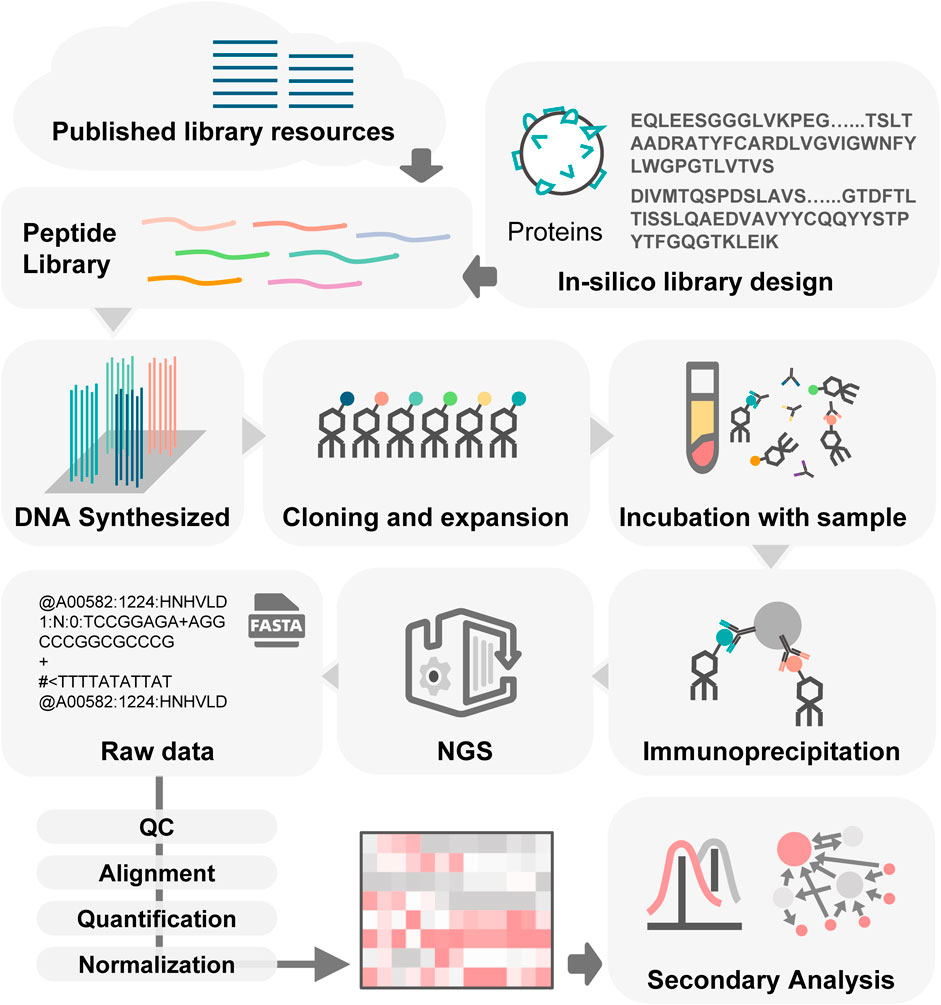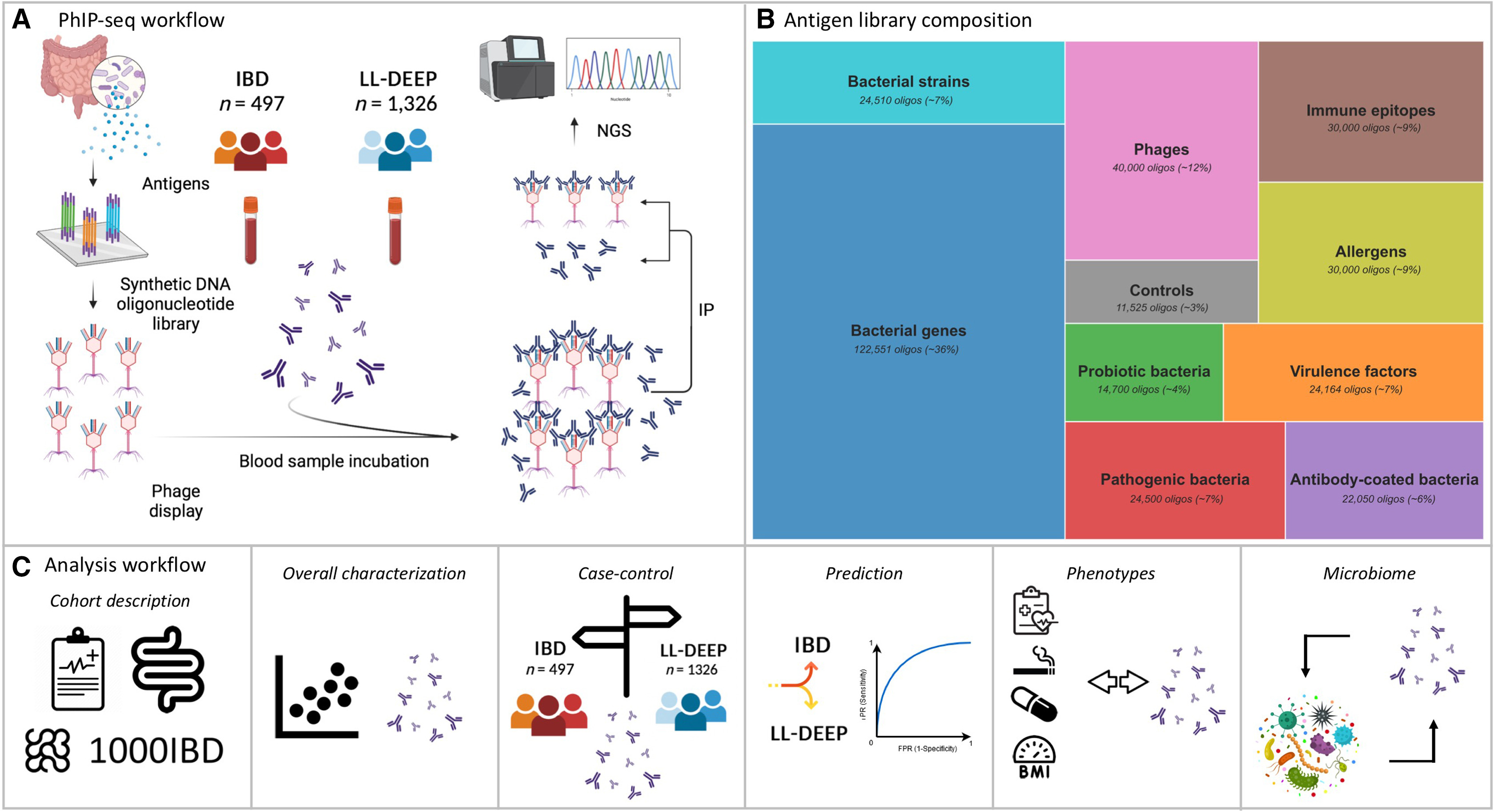PhIP-Seq Antibody Analysis Services
Phage immunoprecipitation sequencing (PhIP-Seq) antibody analysis is a high-throughput screening technology designed to analyze antibody-antigen interactions in body fluids and comprehensively profile the immune system’s response to antigens. The core principle involves utilizing a phage display library to express a vast array of peptide antigens, followed by immunoprecipitation (IP) to enrich phage particles bound by specific antibodies present in the sample. Next-generation sequencing (NGS) is then employed to analyze antigen sequences and identify antibody-recognized targets. This method enables the simultaneous detection of millions of potential antigen epitopes, providing a systematic analysis of the antibody repertoire.
PhIP-Seq antibody analysis services are widely applied in autoimmune disease research, infectious disease studies, allergy investigations, cancer immunotherapy, and vaccine development. For example, in autoimmune disease research, this technique can be used to identify autoantibody targets and elucidate immune dysregulation mechanisms. In infectious diseases, it helps recognize pathogen-specific antibody responses and screen for protective antigens. In cancer immunology, PhIP-Seq is instrumental in analyzing antibody-mediated tumor immune responses, aiding in the development of novel immunotherapies. Additionally, this technology is valuable for biomarker discovery, personalized medicine, and immune system health monitoring, providing strong support for precision medicine.

Huang, Z R. et al. Frontiers in Bioinformatics, 2024.
Figure 1. Workflow of PhIP-Seq.
Services at MtoZ Biolabs
Utilizing next-generation sequencing (NGS) and phage display technology, MtoZ Biolabs offers PhIP-Seq antibody analysis services to comprehensively analyze antibody targets in samples, accurately identifying antigen epitopes and immune response patterns. Our services encompass phage display library construction, antibody immunoprecipitation (IP), high-throughput sequencing, and bioinformatics analysis, ensuring high-sensitivity and high-specificity antibody repertoire profiling.
Service Advantages
1. High-Throughput, Unbiased Antibody-Antigen Screening
Utilizing phage display technology combined with next-generation sequencing (NGS), PhIP-Seq antibody analysis services enable the simultaneous screening of millions of antigen epitopes. Compared to traditional antibody screening methods, this approach offers significantly higher coverage and sensitivity.
2. Precise Identification of Antibody Targets
PhIP-Seq antibody analysis enables the quantitative analysis of antibodies in biological samples such as serum, plasma, and cerebrospinal fluid, accurately identifying antigenic epitopes recognized by the immune system. This provides reliable data for research on autoimmune diseases, infectious diseases, and cancer immunology.
3. Broad Applicability Across Various Research Fields
This technology is widely applicable to autoimmune disease biomarker discovery, infectious disease antigen profiling, cancer immune monitoring, vaccine development, and personalized immunotherapy research, addressing both basic research and clinical translation needs.
4. High Sensitivity and Reproducibility
Utilizing the Illumina high-throughput sequencing platform combined with advanced bioinformatics analysis, PhIP-Seq antibody analysis services ensure highly sensitive detection of antibody targets while maintaining exceptional data reproducibility and reliability.
5. Customized Analytical Solutions
MtoZ Biolabs offers tailored PhIP-Seq antibody analysis solutions based on specific research needs, including custom antigen library design, sample type optimization, antibody abundance quantification, and in-depth data analysis, supporting precision medicine and immunological research.
Applications
1. Autoimmune Disease Research
PhIP-Seq antibody analysis services can be used to detect autoantibodies in patients and identify autoantigens associated with systemic lupus erythematosus (SLE), rheumatoid arthritis (RA), multiple sclerosis (MS), and other autoimmune diseases. This provides crucial data support for disease diagnosis and classification.
2. Pathogen-Specific Antigen Profiling in Infectious Diseases
This technology enables a comprehensive analysis of individual or population-level antibody responses to viruses, bacteria, and other pathogens, including influenza virus, SARS-CoV-2, and HIV. It plays a vital role in vaccine development and herd immunity studies.
3. Cancer Immunomonitoring and Tumor Biomarker Discovery
PhIP-Seq antibody analysis services facilitate antibody response profiling in cancer patients, enabling the identification of tumor-specific antigens. This supports early cancer diagnosis, biomarker discovery, and the investigation of immune response mechanisms in cancer immunotherapy.
4. Vaccine Development and Immune Response Evaluation
By analyzing antibody profile changes before and after vaccination, PhIP-Seq enables the assessment of vaccine immunogenicity and antibody durability, providing critical data for vaccine optimization.
5. Personalized Immunotherapy
In the field of precision medicine, PhIP-Seq antibody analysis services facilitate the identification of patient-specific antigens, supporting the development of personalized immunotherapies to enhance treatment precision and efficacy.
Case Study
1. Phage-Display Immunoprecipitation Sequencing of the Antibody Epitope Repertoire in Inflammatory Bowel Disease Reveals Distinct Antibody Signatures
The study aims to analyze the antibody epitope repertoire in inflammatory bowel disease (IBD) patients using phage-display immunoprecipitation sequencing (PhIP-Seq) to identify IBD-specific antibody biomarkers. The study subjects include patients with Crohn’s disease (CD) and ulcerative colitis (UC), as well as healthy controls. The methodology involves PhIP-Seq technology, where a high-throughput phage-displayed peptide library is constructed and combined with patient serum antibodies for immunoprecipitation, followed by next-generation sequencing (NGS) to identify antibody-recognized epitopes and conduct bioinformatics analysis. The results reveal significant differences in the antibody epitope repertoire between IBD patients and healthy individuals, with CD and UC patients displaying distinct antibody recognition patterns, particularly in their targeting of gut microbiota-associated antigens and host protein antigens. Additionally, the study identifies several specific antigens that may be associated with IBD immune responses and a set of potential antibody biomarkers for disease classification. The study concludes that PhIP-Seq technology enables a systematic analysis of the antibody response in IBD patients, offering novel strategies for early diagnosis, precise disease stratification, and targeted therapy, while highlighting the crucial role of host-microbiome interactions in IBD immune regulation.

Bourgonje, A R. et al. Immunity, 2023.
Figure 1. Methodological Workflow of the Study.
Deliverables
1. Comprehensive Experimental Details
2. Materials, Instruments, and Methods
3. Data Analysis, Preprocessing, and Estimation
4. Bioinformatics Analysis
5. Raw Data Files
MtoZ Biolabs, an integrated Chromatography and Mass Spectrometry (MS) Services Provider, provides advanced proteomics, metabolomics, and biopharmaceutical analysis services to researchers in biochemistry, biotechnology, and biopharmaceutical fields. Our ultimate aim is to provide more rapid, high-throughput, and cost-effective analysis, with exceptional data quality and minimal sample consumption. Free project evaluation, welcome to learn more details!
How to order?







